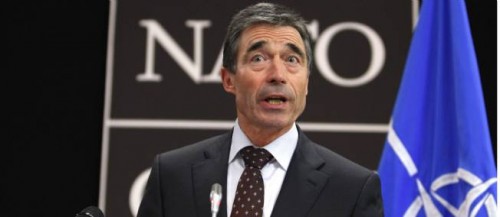dimanche, 10 février 2013
NATO Charts Out Global Role
Sahel To Central Asia: NATO Charts Out Global Role
Rasmussen: NATO Must be Ready for Any Future Threat
By Cheryl Pellerin
Ex: http://rickrozoff.wordpress.com/
====
“Missile defense is a core element of our collective defense,” [Rasmussen said], “and the deployment of Patriot missiles to Turkey is a real response to a real threat.”
Many European allies contribute to NATO’s missile defense system, but Rasmussen said he can envision European navies upgrading their ships with missile defense radars and interceptors so they can deploy alongside United States vessels.
To make sure that NATO remains the gold standard of Euro-Atlantic security into the 21st century, he said, the alliance must build on its gains from operations like its International Security Assistance Force mission in Afghanistan “rather than cash in what some may perceive as a post-ISAF dividend.”
====
MUNICH: On the second day of the Munich Security Conference, NATO Secretary-General Anders Fogh Rasmussen told the international audience here that the end of the war in Afghanistan gives the alliance a chance to plan for the future.
The end in 2014 of NATO’s biggest operation gives NATO a chance to generate key capabilities, engage robustly with new geopolitical realities and rebalance its priorities and commitments, he said.
“In other words, an opportunity to plan for the future,” Rasmussen said, adding that such a plan must determine what NATO will do next, how NATO will do it, and what kind of alliance it will be.
“We will continue to respond to crises whenever and wherever the allies judge their security interests are at stake because this is our core business,” the secretary-general said.
“When I look at our world, I see an arc of crises stretching from the Sahel to Central Asia,” he added, “[but]…this does not mean we will have to intervene everywhere nor that we are set for confrontation. But it does mean we must stand ready to deter and defend against any threat.”
Rasmussen said NATO must keep its operational edge and retain a complete range of capabilities, with increased importance for missile and cyber defense and special operations forces.
“Missile defense is a core element of our collective defense,” he added, “and the deployment of Patriot missiles to Turkey is a real response to a real threat.”
Many European allies contribute to NATO’s missile defense system, but Rasmussen said he can envision European navies upgrading their ships with missile defense radars and interceptors so they can deploy alongside United States vessels.
“We must also improve our cyber resilience,” he said, describing a potentially critical role for NATO in defining a common training approach among allies and in providing expert help to allies who come under cyber attack.
“We will also need forces with the skills and speed to act decisively,” Rasmussen said, envisioning a vital role for NATO’s new Special Operations Forces Headquarters in planning and coordinating missions and improving the ability of allied special operations forces to work together.
To make sure that NATO remains the gold standard of Euro-Atlantic security into the 21st century, he said, the alliance must build on its gains from operations like its International Security Assistance Force mission in Afghanistan “rather than cash in what some may perceive as a post-ISAF dividend.”
A better choice is to reinvest the ISAF dividend in defense for a maximum return, Rasmussen said, including through NATO’s Connected Forces – which seeks to create forces that act and think as one – and its Smart Defense initiatives.
NATO’s multinational response force can deploy quickly when needed, but Rasmussen wants the alliance to revitalize that force, he said, “to keep our ability to train and operate together as allies and with partners, take advantage of the United States’ decision to rotate dedicated units to Europe and conduct more demanding, realistic and frequent exercises.”
The NATO Response Force should become the engine of the alliance’s future readiness, he added, and multinational cooperation is key to keeping costs down and capabilities strong.
Rasmussen sees NATO connecting more closely with the alliance’s most able operational partners, reinforcing its cooperation with the United Nations and the European Union, deepening its strategic relationship with Russia and shifting from operational engagement to operational readiness.
Such readiness and flexibility come at a cost, he added.
“In the decade since 2001, the U.S. share of NATO defense expenditure has increased from 63 percent to 72 percent,” the secretary-general said, and in the last few years all but three European allies have cut their defense budgets.
“I am concerned about this gap in defense spending but I am even more concerned by the gap in some key capabilities,” he added.
To correct this, Rasmussen said, he would like to see the alliance moving toward a day when no single ally provides more than 50 percent of certain critical capabilities.
“This will require European allies to do more,” Rasmussen said, adding that a strong European contribution to NATO’s capabilities will sustain a strong U.S. commitment to NATO.
All allies must also show the political will to support each other, living up to NATO’s role as the political forum for transatlantic consultations on common security concerns, he said, “…because now and after 2014, we can only stay successful together.”
00:05 Publié dans Actualité, Géopolitique | Lien permanent | Commentaires (0) | Tags : otan, politique internationale, géopolitique, atlantisme, bellicisme, sahel, afrique, affaires africaines, asie, affaires asiatiques |  |
|  del.icio.us |
del.icio.us |  |
|  Digg |
Digg | ![]() Facebook
Facebook




Les commentaires sont fermés.